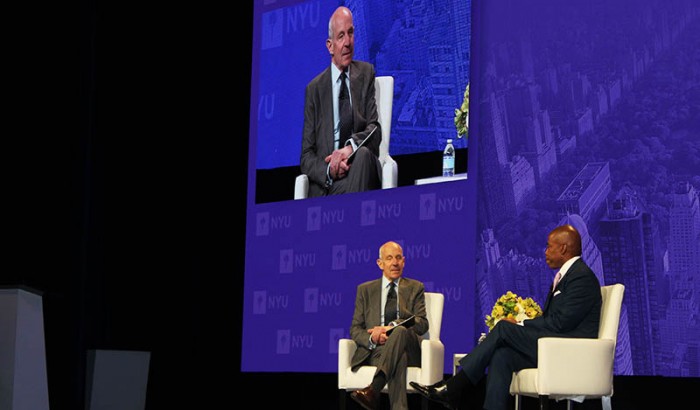By:Dr.Adal M.Hussain,Phd (AKA) Dr. Abbey ,Editor @ Large for World Liberty TV
The NYU School of Professional Studies Jonathan M. Tisch Center of Hospitality convened top hospitality industry executives and thought leaders from across the US and around the world for its 44th Annual NYU International Hospitality Industry Investment Conference at the New York Marriott Marquis in New York City. As always, the Conference provided a deep dive into the current state of the industry and what is to be expected in the months to come.

Dr Abbey with Jonathan M.Tisch Conference Chair for NYU Hospitality
The first day of content was highlighted by thought-provoking general sessions with high-profile leaders and innovators sharing their insights, as well as break-out sessions that covered groundbreaking topics—from Digital Securities: Tokenized Property Interests and the Capital Stack of the Future to Private Capital—Land of Opportunity in the New Normal Environment.
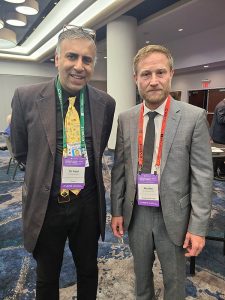
Dr Abbey with Prof Nicholas Graf Associate Dean Jonathan M.Tisch Hospitality
Conference Chair Jonathan M. Tisch, chairman and CEO of Loews Hotels & Co. and co-chairman of the board of Loews Corporation, delivered powerful remarks that focused on the future of a reimagined travel industry. While he acknowledged the disruptions the industry has faced, he remained optimistic, stating that “travel is essential to the way we work and live—because it has tremendous potential to connect us—to each other, to ideas, and to opportunity. It brings people together, broadens perspectives, and spurs innovation and progress. It’s the antidote to isolation and tribalism. And at a time of turning in, locking down, and scaling back, it’s more urgently needed than ever.” He reminded those attending the Conference that “by connecting people to each other, to ideas, and to opportunity, we can demonstrate just how essential we are—not just in spite of the challenges of the past several years, but because of them.”
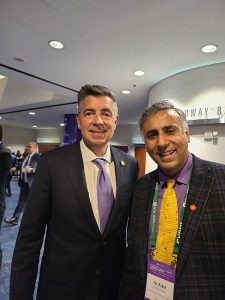
Dr Abbey with Chip Rodgers President & CEO American Hotel & Lodging Association (AHLA)
“The CEOs Check-In: A View from the Top,” featured hospitality executives who discussed the evolving investment landscape, and how the hospitality industry is growing once again. Sara Eisen, anchor, “Closing Bell,” CNBC, moderated this discussion with Keith Barr, chief executive officer, IHG Hotels & Resorts; Sébastien M. Bazin, chairman and chief executive officer, Accor; Anthony Capuano, chief executive officer, Marriott International; Mark S. Hoplamazian, president and chief executive officer, Hyatt Hotels Corporation; and Christopher J. Nassetta, president and chief executive officer, Hilton. All of the CEOs were optimistic regarding the resiliency of the industry and the pent-up demand for travel caused by the pandemic. They also however acknowledged the continuing problem of the labor shortage and the fact that they must make hospitality jobs more attractive by offering flexible schedules and pay. The CEOs also discussed the critical need for sustainability and for offering travelers choices and greater services for the higher prices they are paying. They addressed the increasingly blurry line between business and leisure travel and the new opportunities it provides hotels and travel destinations to satisfy increasing demands for combined experiences.
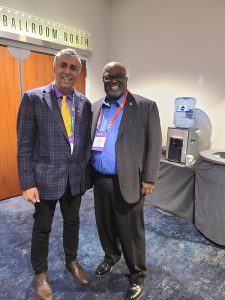
Dr Abbey with Andy Ingraham Founder President CEO NABHOOD
During “Hotel Values and Trends – Statistically Speaking and Analysis of Industry Trends,” Amanda Hite, president of STR, and Stephen Rushmore, Jr., president and chief executive officer, HVS, provided deep data on trends in the hotel and travel industry that indicate things are looking up. There have been regular gains in occupancy since President’s Day weekend, business travel has started to pick up, and because household income and employment is strong, increases in travel are expected to continue, but growth may be less pronounced in 2023. While things continue to look up and current construction projects are being finished, new hotel development projects are not where they were pre-pandemic. Inflation, volatility, and supply chain issues have had a real impact on hotel development.

Dr Abbey with James Bermingham Chief Executive Officer at Virgin Hotels
During “Beyond the Boardroom,” which took the form of a fireside chat, Conference Chair Jonathan M. Tisch, chairman and CEO of Loews Hotels & Co. and co-chairman of the board of Loews Corporation, interviewed New York City Mayor Eric Adams. The two discussed the importance of travel and tourism for the City and the ways to increase it to pre-pandemic levels. The Mayor focused on continuing to reduce crime, on making the City more business friendly, and encouraging workers to return to their offices. He also touted the City’s tremendous diversity in being a major selling point for attracting visitors, industries, and businesses.

Dr Abbey with John Cohlan, CEO of Margaritaville
During Day Two of the 44th Annual NYU International Hospitality Industry Investment Conference, hosted by the NYU SPS Jonathan M. Tisch Center of Hospitality at the New York Marriott Marquis in New York City, the conversation focused on the changing dynamics of the industry and how hotels and the entire travel and tourism industry are keeping up with, and staying ahead of, factors that are profoundly influencing the business including changing consumer preferences, technology, labor shortages, supply chain issues, competition from private rentals, and the demands of a younger generation of travelers who are coming into their own.

Dr Abbey with Hubert Viriot CEO YOTEL
Kicking off day two, Eileen Crowley, partner; vice chair—US Transportation, Hospitality and Services Co-Leader, Deloitte & Touche, moderated the “Industry Leaders Discuss the Future of Travel and How To Capitalize on What’s Coming Next” panel, which featured industry leaders including John Cohlan, chief executive officer, Margaritaville; Sloan Dean, chief executive officer and president, Remington Hotels; John Murray, president and chief executive officer, Sonesta International Hotels; Peter Strebel, chairman, Omni Hotels & Resorts; and Jeff Wagoner, president and chief executive officer, Outrigger Hospitality Group.
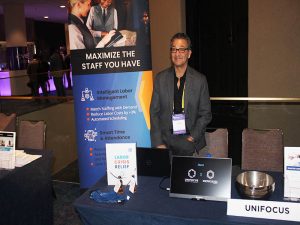
UNIFOCUS Exhibiting
The conversation revolved around how to meet changing consumer demands while dealing with labor shortages, supply chain issues, and competitors in the private rental space, such as Airbnb. One of the major topics of discussion focused on the up-and-coming generation—from a consumer standpoint and a future employee standpoint. Panelists discussed working more closely with universities to reach college students, who they believe will be instrumental in implementing and utilizing new technology. They also focused on trends related to group travel and experiential services—designed to keep guests happy but sometimes harder to implement due to labor shortages, which add to the complexity of fulfilling these demands.
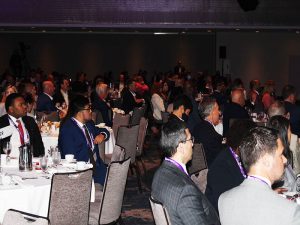
Close to 1200 people in attendance
During the “Leaders Check In Part Two: Consolidation, Scale, and the Structure of the Hospitality Industry,” moderated by Jeanelle Johnson, principal and lead client partner, PricewaterhouseCoopers, technology dominated the conversation between Geoff Ballotti, president and CEO, Wyndham Hotels & Resorts; Larry Cuculic, president and CEO, Best Western Hotels & Resorts; Kevin J. Jacobs, CFO and president, Global Development, Hilton; Stephanie Linnartz, president, Marriott International; Elie W. Maalouf, CEO, IHG Hotels and Resorts; and Patrick Pacious, president and CEO, Choice Hotels International.

One of many receptions at NYU Hospitality
The group discussed the concept of the “phigital”—a combination of the physical world and the digital world. All agreed the hospitality industry is people-oriented and will never become fully automated. Yet, there was a consensus that technology can provide efficiency, and data and analytics can ultimately help create a highly personalized and seamless experience for guests. Across the industry, technology is one of the largest investments from a time and money perspective. This challenges industry leaders to make strategic decisions to ensure ROI. Diversity and inclusion were also prominent themes, along with sustainability, with executives agreeing that both are critical for industry success and are important to guests and investors. The conversation ended in excitement about the industry’s future, with all the panelists agreeing that while they are cautiously optimistic, they believe increased consumer savings, higher wages, and pent-up demand will contribute to a successful 2022 despite concerns about the larger economy.
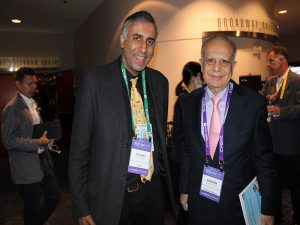
Dr Abbey with Sunder G Advani Chairman of Caravelo Beach Resort
The “Industry Leaders’ Think Tank” moderated by Umar Riaz, managing director, EY, featured Joe Ahmed-Youssef, executive vice president of business intelligence and data, hospitality, Amadeus; Tim Hentschel, co-founder and chief executive officer, Hotel Planner; Richard Holden, vice president and general manager, travel, Google; David Kallery, president, Inspirato; and Jean-Jacques Morin, deputy chief executive officer and chief financial officer group, Accor, and focused on the implementation of technology.
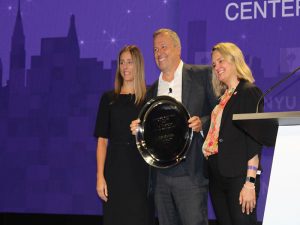
Stephen W. Brener Silver Plate Award winner Michael J. Deitemeyer
Richard Holden of Google discussed the use of technology from a business perspective—specifically the use of SEO for marketing and sales. All panelists shared that their companies are investing heavily in technology. Other areas requiring funding included investment in employees and investment in developing experiential services for guests. From food and beverage to building itineraries, the panelists discussed the critical point that hotel leaders must focus on more than just the walls and floors of the hotel. In the area of emerging trends, hotels are seeing customers book as little as 0-6 days before their stay, while others are seeing guests book as far as a year in advance. Similar to other panels, there was excitement about the new opportunities in the industry, but there also was an acknowledgment that new solutions are needed to address continually evolving challenges.
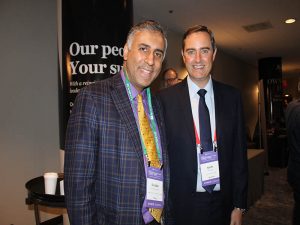
Dr Abbey with Keith Barr CEO IHG Hotels & Resorts
About the NYU SPS Jonathan M. Tisch Center of Hospitality: The NYU School of Professional Studies Jonathan M. Tisch Center of Hospitality, now celebrating 26 years of academic excellence, is a leading center for the study of hospitality, travel, and tourism. Founded in 1995, the Tisch Center was established in response to the growing need for hospitality and tourism undergraduate and graduate education. Its cutting-edge curricula attract bright, motivated students who seek to become leaders in their fields.

Dr Abbey with Chef Butcher at Accor Hotel Reception
Through its undergraduate degree in hotel and tourism management, its graduate degrees in hospitality industry studies, tourism management, and event management; a plethora of Professional Pathways programs; and its world-renowned hospitality investment conference, students gain the knowledge and the skill sets that enable them to manage change, to communicate, to thrive in complex work environments, and to advance the businesses of hospitality, travel, and tourism.
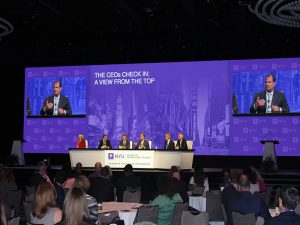
One of Many panels in progress
The Tisch Center recently launched the Hospitality Innovation Hub (HI Hub), which will foster entrepreneurship and creative solutions for the industries it serves. The state-of-the-art facilities offer students, start-ups, established industry partners, and investors opportunities to learn, discover, innovate, and invest. For more information about the NYU SPS Jonathan M. Tisch Center of Hospitality, Click here.
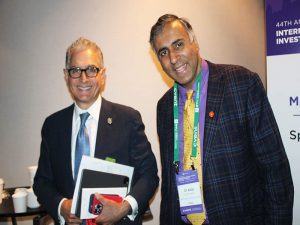
Dr Abbey with Mark Hoplamazian President & CEO Hyatt Hotels Corporation
About the NYU School of Professional Studies, Celebrating 87 Years of Excellence in Applied Professional Education: For more than 87 years, the NYU School of Professional Studies (NYU SPS) has been a deeply respected institution of higher education that is grounded in applied learning. From its early years, training returning World War II veterans to fulfill the nation’s urgent need for skilled technical workers, it has evolved into a professional education powerhouse that offers 22 graduate degrees, 14 bachelor’s degrees for traditional and degree completion students, four associate degrees, and a plethora of continuing education courses and credentials.
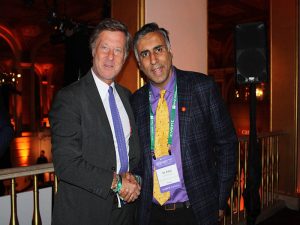
Dr.Abbey with Sebastien M.Bazin Chairman & CEO Accor
NYU SPS is a thought leader, and serves as an incubator for new ideas in industries that are constantly changing, including real estate, real estate development, and construction management; hospitality, tourism, travel, and event management; financial planning; global affairs and global security, conflict, and cybercrime; global sport and sports business; publishing; executive marketing and strategic communications, integrated marketing; public relations; project management; executive coaching and organizational consulting, human resource management and development, and human capital analytics and technology; management and systems; translation; and professional writing.
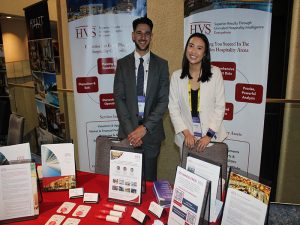
HVS Co Exhibiting
It is focused on building skills that open doors to opportunities in emerging fields and global markets. NYU SPS faculty members are leading experts in their areas of discipline, with a hands-on approach that encourages students to push beyond their limits and to break new ground.
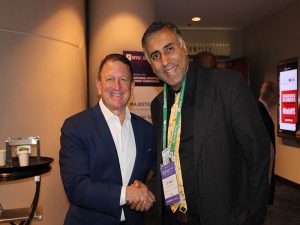
Dr Abbey with Jeff Wagoner President & CEO Outrigger Hospitality Group
Home to some of the largest and most prestigious industry conferences in the world, including the Schack Institute of Real Estate’s Capital Markets Conference, REIT Symposium, and National Symposium of Women in Real Estate; and the Jonathan M. Tisch Center’s International Hospitality Industry Investment Conference, the School’s invaluable connections to industry leaders is a truly distinguishing factor in the education that it provides.

Mr Tisch Interviewing Mayor Eric Adams
Through career development services and resources provided by the NYU Wasserman Center for Career Development at NYU SPS, guest lecturers, site visits, participation in numerous conferences and events, and Global Field Intensives, students benefit from an NYU education that will set them apart. In addition, they have the opportunity to learn from and network with more than 39,000 NYU SPS alumni who live, work, and contribute to innovation in industry around the world. To learn more NYU SPS Click Here.
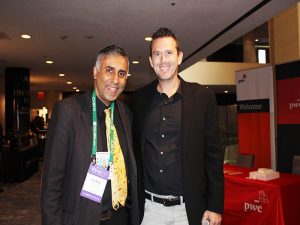
Dr Abbey with Sloan Dean CEO & President Remington Hotels
It was truly an elite conference in the Hospitality sector, who is who? in the Hospitality sector attended from all over the world. See more in our World Liberty TV, Business Channels and blogs by clicking here.




